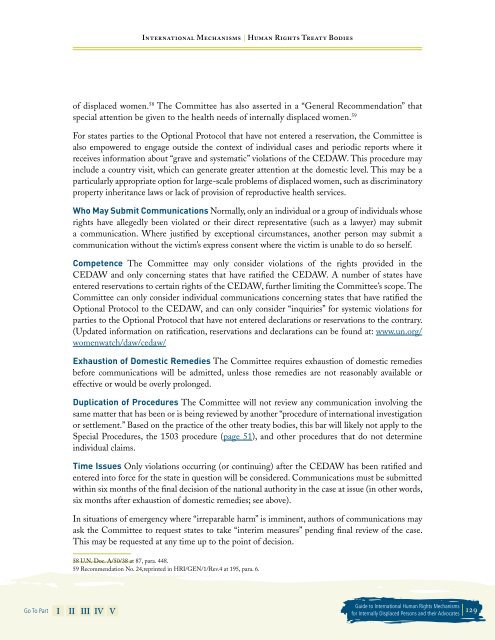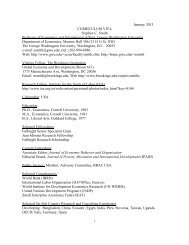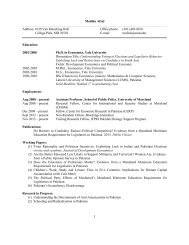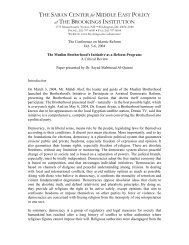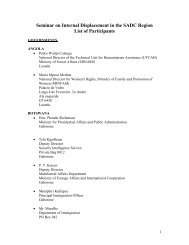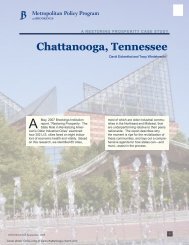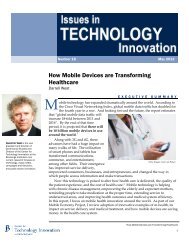Guide to International Human Rights Mechanisms - Brookings
Guide to International Human Rights Mechanisms - Brookings
Guide to International Human Rights Mechanisms - Brookings
Create successful ePaper yourself
Turn your PDF publications into a flip-book with our unique Google optimized e-Paper software.
Go To Part I II III IV V<br />
<strong>International</strong> <strong>Mechanisms</strong> | <strong>Human</strong> <strong>Rights</strong> Treaty Bodies<br />
of displaced women. 58 The Committee has also asserted in a “General Recommendation” that<br />
special attention be given <strong>to</strong> the health needs of internally displaced women. 59<br />
For states parties <strong>to</strong> the Optional Pro<strong>to</strong>col that have not entered a reservation, the Committee is<br />
also empowered <strong>to</strong> engage outside the context of individual cases and periodic reports where it<br />
receives information about “grave and systematic” violations of the CEDAW. This procedure may<br />
include a country visit, which can generate greater attention at the domestic level. This may be a<br />
particularly appropriate option for large-scale problems of displaced women, such as discrimina<strong>to</strong>ry<br />
property inheritance laws or lack of provision of reproductive health services.<br />
Who may submit communications Normally, only an individual or a group of individuals whose<br />
rights have allegedly been violated or their direct representative (such as a lawyer) may submit<br />
a communication. Where justified by exceptional circumstances, another person may submit a<br />
communication without the victim’s express consent where the victim is unable <strong>to</strong> do so herself.<br />
competence The Committee may only consider violations of the rights provided in the<br />
CEDAW and only concerning states that have ratified the CEDAW. A number of states have<br />
entered reservations <strong>to</strong> certain rights of the CEDAW, further limiting the Committee’s scope. The<br />
Committee can only consider individual communications concerning states that have ratified the<br />
Optional Pro<strong>to</strong>col <strong>to</strong> the CEDAW, and can only consider “inquiries” for systemic violations for<br />
parties <strong>to</strong> the Optional Pro<strong>to</strong>col that have not entered declarations or reservations <strong>to</strong> the contrary.<br />
(Updated information on ratification, reservations and declarations can be found at: www.un.org/<br />
womenwatch/daw/cedaw/<br />
exhaustion of Domestic remedies The Committee requires exhaustion of domestic remedies<br />
before communications will be admitted, unless those remedies are not reasonably available or<br />
effective or would be overly prolonged.<br />
Duplication of Procedures The Committee will not review any communication involving the<br />
same matter that has been or is being reviewed by another “procedure of international investigation<br />
or settlement.” Based on the practice of the other treaty bodies, this bar will likely not apply <strong>to</strong> the<br />
Special Procedures, the 1503 procedure (page 51), and other procedures that do not determine<br />
individual claims.<br />
Time issues Only violations occurring (or continuing) after the CEDAW has been ratified and<br />
entered in<strong>to</strong> force for the state in question will be considered. Communications must be submitted<br />
within six months of the final decision of the national authority in the case at issue (in other words,<br />
six months after exhaustion of domestic remedies; see above).<br />
In situations of emergency where “irreparable harm” is imminent, authors of communications may<br />
ask the Committee <strong>to</strong> request states <strong>to</strong> take “interim measures” pending final review of the case.<br />
This may be requested at any time up <strong>to</strong> the point of decision.<br />
58 U.N. Doc. A/50/38 at 87, para. 448.<br />
59 Recommendation No. 24,reprinted in HRI/GEN/1/Rev.4 at 195, para. 6.<br />
<strong>Guide</strong> <strong>to</strong> <strong>International</strong> <strong>Human</strong> <strong>Rights</strong> <strong>Mechanisms</strong><br />
for Internally Displaced Persons and their Advocates 12


